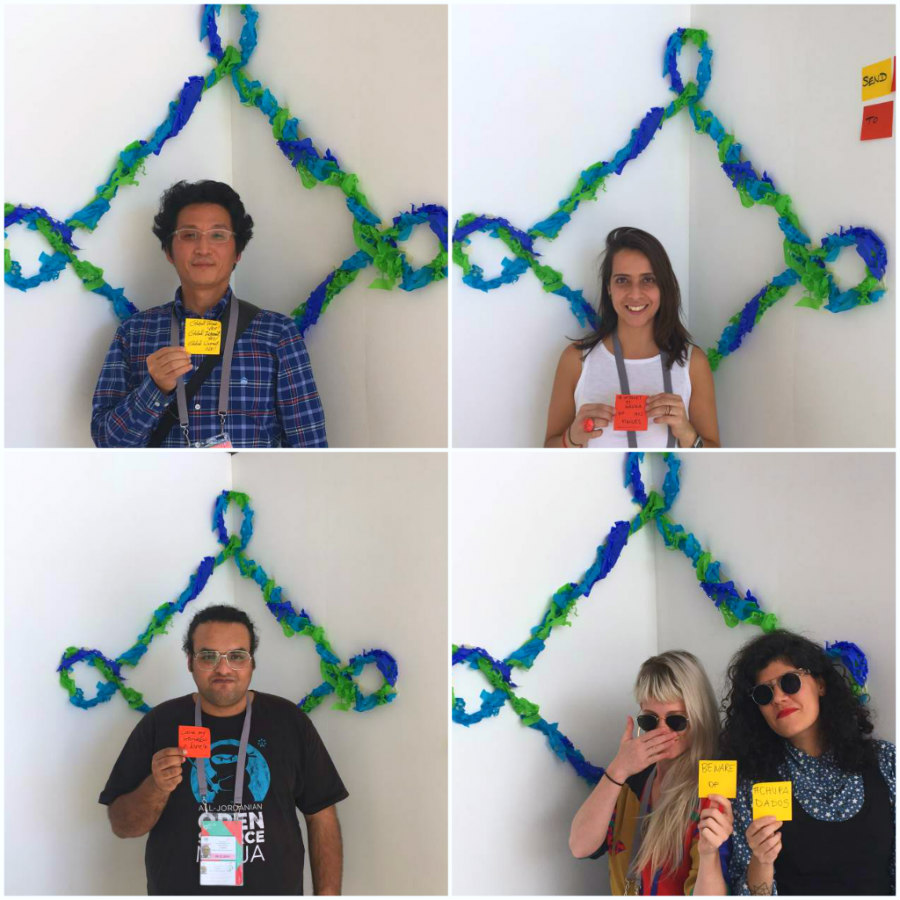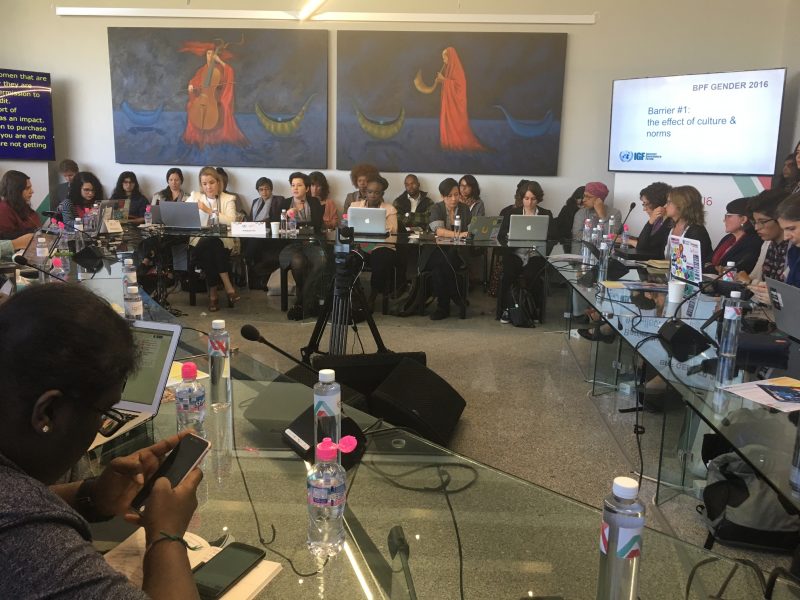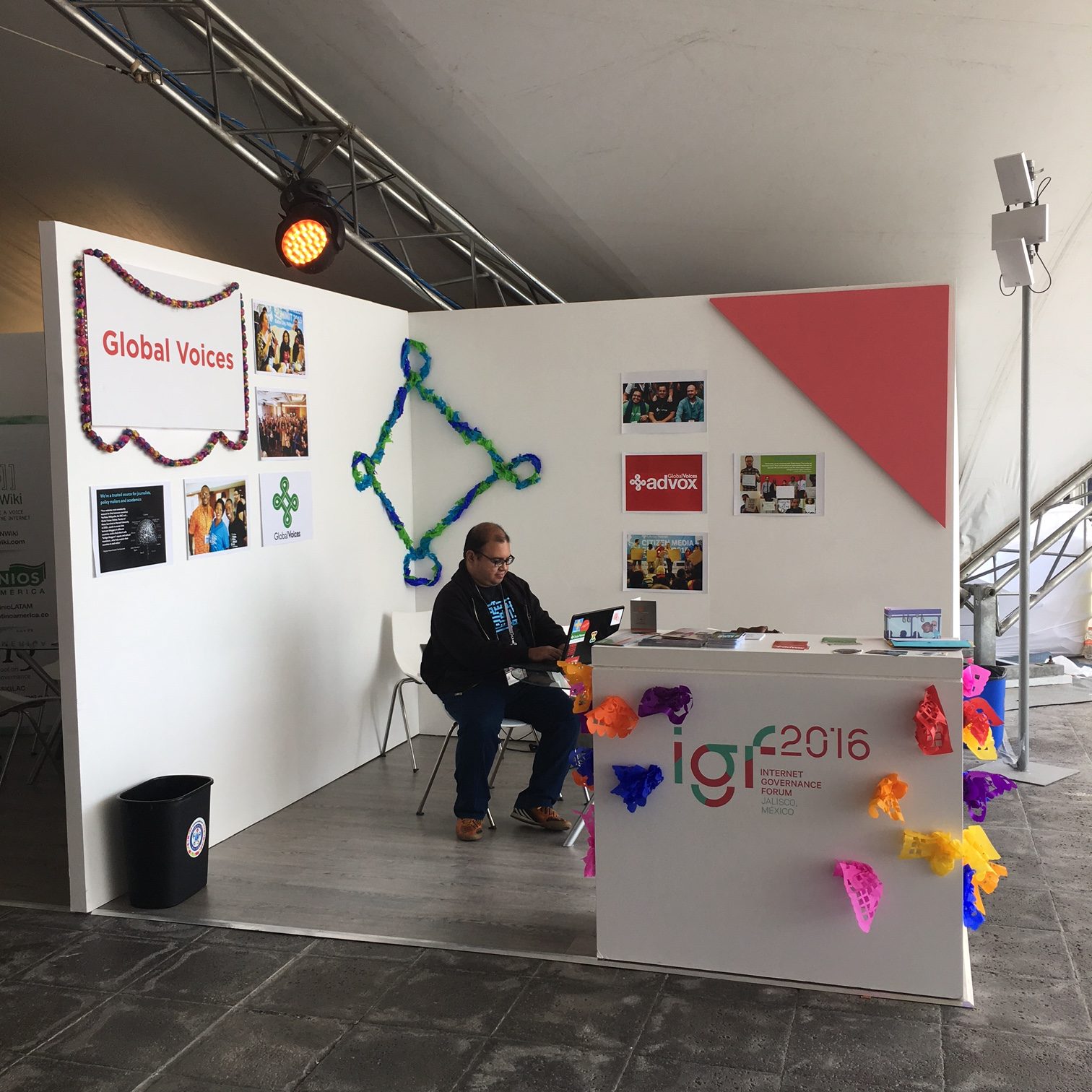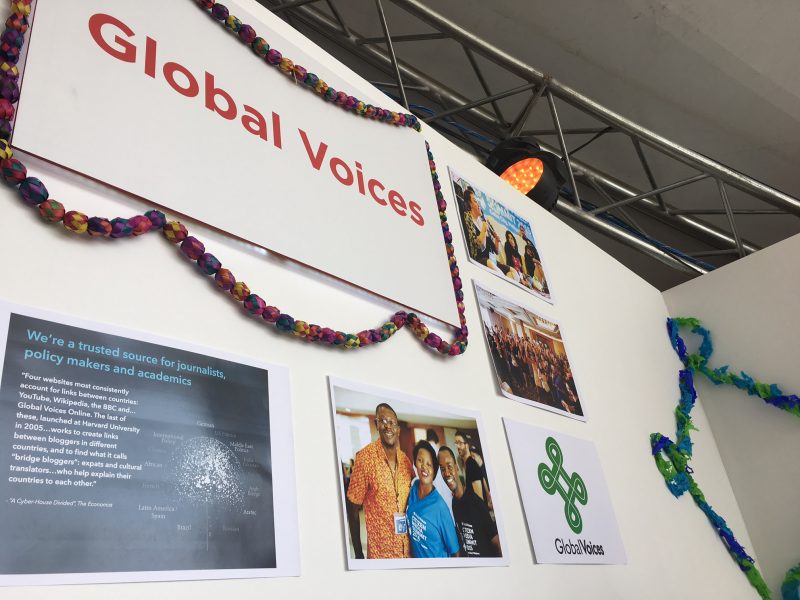
Clockwise from left: KS Park (S. Korea), Giovanna Salazar (Mexico), Natasha and Joana Varon (Brazil), Tara (Jordan).
Who's in charge of the Internet? The answer depends on who you ask. Last month, Lingua Director Gohary and I traveled to Guadalajara, Mexico for the tenth annual Internet Governance Forum, or IGF. Officially administrated by the United Nations, the goal of the IGF is to bring together a range of people who hold some stake — and usually have some power — in deciding how the Internet works.
These people come from lots of different backgrounds. Some are technical experts, who work on things like building new Internet protocols or infrastructure. Some come from big companies like Google and Baidu. Others come from government telecommunications agencies. And others come from the broadly-defined category known as “civil society” — that's us.

Ellery (Advox director), Jonathan McCully (attorney with Media Legal Defence Initiative), and Marcel Leonardi of Google Brazil. Photo via IMS.
This year's IGF had a strong focus on issues of access to technology and gender inequality online. Gender-related harassment was a very hot topic under this umbrella. I joined colleagues from the Media Legal Defence Initiative, Paradigm Initiative Nigeria, Digital Rights Foundation Pakistan and Google for a panel discussion about online harassment and operational responses to harassment.
I also got to participate in a collaborative design thinking workshop on solutions to harassment, where I joined a group of advocates, all women, from Brazil, Pakistan, and the Dominican Republic, to talk about non-consensual intimate images on the Internet (aka “revenge porn”). We created a small proposal aimed at companies like Twitter and Facebook, both of whom had staff in the workshop, pushing them to consider increasing the consequences for people who post private, intimate images without the consent of the subject. We also urged them to more closely monitor people who share or retweet intimate images.
Another great session I attended focused on the disparities between urban and rural women in Africa and Asia with regard to their use of the Internet and mobile communication platforms. As you can see below, the session was packed:

Association for Progressive Communications’ Jac Sm Kee presents.
As several people pointed out, both in the room and on Twitter, many of the gender-related sessions at IGF took place in smaller rooms, despite being among the most popular and well-attended sessions at the conference.
This gave us a glimpse into the politics of the IGF, which is not exactly neutral as a space for speech and debate. Although the event is technically “multi-stakeholder” and open to anyone who wants to participate (as long as they don't mind handing over a state-issued ID), not all topics are treated equally. While there is lots of talk about democratic processes and human rights principles, it can be challenging to discuss actual human rights violations.
At the opening ceremony, the first thing the presenter told the crowd was to be respectful of all stakeholders. He warned that IGF officials would take note of any “demonstration and materials distributed” that offended the interests of other stakeholders, and that participants could be banned from the event if their messages were considered to be problematic. At an event attended by representatives from nearly every government in the world, this is a tall order.
As representatives of GV, we knew we wanted to make an impression on people who might not know GV, but could be interested in learning more about us or even joining the community. So we decided to focus our energy on creating a dynamic space where our friends and potential future contributors could visit us and learn about what we do. This is the Global Voices booth at IGF:

As you can see in the foreground, we had a small counter where we put out GV stickers and invited our friends from other NGOs to put their materials for sharing. On the first day of the conference, a security officer visited our booth, collected one of each of the materials we had on display, and asked me several questions about our advocacy on surveillance. He went away and later came back with three other guards, who looked over the materials and the booth, and then left. I'm glad to say we never saw them again!

We had fun posting images of our friends and community members. As I was pasting the above picture of Nwach, Prudence, and Kofi to the wall, a blogger from Togo stopped, pointed at the picture, and shouted, “that's my friend! Prudence is the queen of Kampala!” He had met her at a recent meeting of bloggers in the region and was delighted to find her here, albeit in 2D.
The booth also allowed us to do activities and gather with our friends without having to do anything “official”, by IGF standards. After a few days, we decided to ask our friends to pose in what became the official GV photo booth, and to hold up a small sign with a message to the world.

Clockwise from top left: KS Park (S. Korea), Giovanna Salazar (Mexico), Natasha and Joana Varon (Brazil), Tara (Jordan).
Here is what they had to say:
KS Park, and Internet law and data protection scholar from South Korea: “Global Voices, YES! Global Internet, YES! Global warrant, NO!”
Giovanna Salazar, a Global Voices author and Internet policy expert with Masde131, from Mexico: “Internet es nuestra – no la vigiles” (in English: “The Internet is ours – don't surveil it”)
Joana Varon and Natasha, digital privacy activists with Coding Rights, from Brazil: “Beware of Chupadatos” Chupadatos, which literally translates as “data sucker”, is a fictional character that they've created in order to help users understand how data collection happens online.
Tara, an Internet policy activist and GV author from Jordan: “Leave my interwebs alone D:”